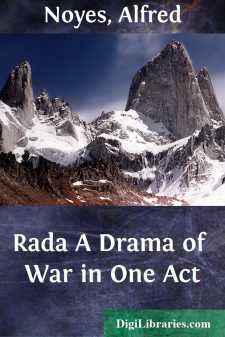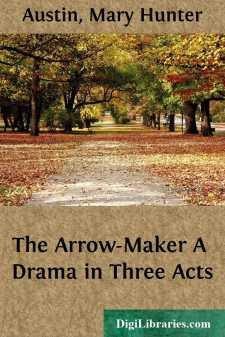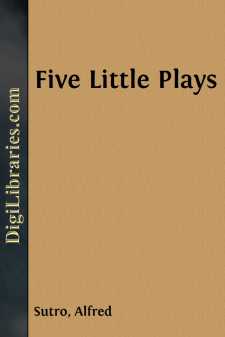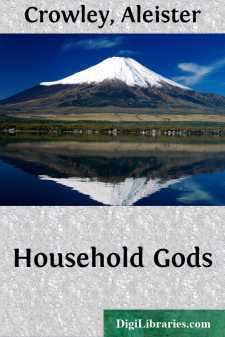Drama Books
Sort by:
by:
Alfred Noyes
RADA SCENE—_A guest-chamber, the typical living-room of a prosperous village doctor in the Balkans. On the left, a small window and an entrance door. On the right, a door leading into a bedroom. At the back, an open fire of logs is burning brightly. Over the fireplace is the eikonostasis, with three richly coloured and gilded eikons, the central one of the Madonna. The light, which is never allowed...
more...
ACT I A country house on a terrace. In front of it a garden. In an avenue of trees, under an old poplar, stands a table set for tea, with a samovar, etc. Some benches and chairs stand near the table. On one of them is lying a guitar. A hammock is swung near the table. It is three o'clock in the afternoon of a cloudy day. MARINA, a quiet, grey-haired, little old woman, is sitting at the table...
more...
PEOPLE IN THE PLAY ALICE GARDNER: Daughter of James K. Gardner, President of the L.I. & W. Railroad "UNCLE" JOSEPH HATCH: Alias "Gentleman Joe" "BRICK" MEAKIN: Alias "Reddy, the Kid" HARRY HAYES: Alias "Grand Stand" Harry CAPTAIN LUCAS: Chief of Police Policemen, Brakemen, Engineers Scene—The dining room in the country house of James K. Gardner on Long...
more...
The greatest difficulty to be met in the writing of an Indian play is the extensive misinformation about Indians. Any real aboriginal of my acquaintance resembles his prototype in the public mind about as much as he does the high-nosed, wooden sign of a tobacco store, the fact being that, among the fifty-eight linguistic groups of American aboriginals, customs, traits, and beliefs differ as greatly as...
more...
by:
Alfred Sutro
THE MAN IN THE STALLS The sitting-room of a little flat in Shaftesbury Avenue. At back is a door leading to the dining-room—it is open, and the dinner-table is in full view of the audience. To the extreme right is another door, leading to the hall. The place is pleasantly and prettily, though quite inexpensively, furnished. To the left, at angles with the distempered wall, is a baby-grand piano; the...
more...
by:
Bernard Shaw
It may surprise some people to learn that in 1915 this little play was a recruiting poster in disguise. The British officer seldom likes Irish soldiers; but he always tries to have a certain proportion of them in his battalion, because, partly from a want of common sense which leads them to value their lives less than Englishmen do [lives are really less worth living in a poor country], and partly...
more...
by:
Aleister Crowley
HOUSEHOLD GODS THE SCENE is at the hearth of CRASSUS, where is a little bronze altar dedicated to the Lares and Penates. A pale flame rises from the burning sandal-wood, on which CRASSUS throws benzoin and musk. He is standing in deep dejection. CRASSUS.Smoke without fire! No thrill of tongues licks up The offerings in the cup.Dead falls desire. Black smoke thou art, O altar-flame, that dost...
more...
by:
Aristophanes
SCENE: A farmyard, two slaves busy beside a dungheap; afterwards, in Olympus. FIRST SERVANT Quick, quick, bring the dung-beetle his cake. SECOND SERVANT Coming, coming. FIRST SERVANT Give it to him, and may it kill him! SECOND SERVANT May he never eat a better. FIRST SERVANT Now give him this other one kneaded up with ass's dung. SECOND SERVANT There! I've done that too. FIRST SERVANT And...
more...
by:
Francis Beaumont
Actus PrimusScena PrimaEnter Juan de Castro, and Michael Perez. Michael PerezAre your Companies full, Colonel? Juan de CastroNo, not yet, Sir:Nor will not be this month yet, as I reckon;How rises your Command? Michael PerezWe pick up still, and as our monies hold out,We have men come, about that time I thinkWe shall be full too, many young Gallants go. Juan de CastroAnd unexperienced,The Wars are dainty...
more...
by:
Thomas Morton
This comedy excites that sensation, which is the best security for the success of a drama—curiosity. After the two first acts are over, and pleasantly over, with the excellent drawn characters of Ashfield and his wife, and the very just satire which arises from Sir Abel's propensity to modern improvements—the acts that follow excite deep interest and ardent expectation; both of which are so...
more...











